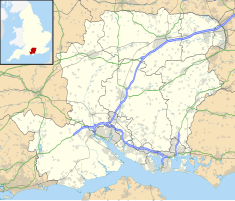Corn Exchange, Romsey
| Corn Exchange, Romsey | |
|---|---|
 Corn Exchange, Romsey | |
| Location | Corn Market, Romsey |
| Coordinates | 50°59′20″N 1°29′57″W / 50.9889°N 1.4993°W |
| Built | 1864 |
| Architectural style(s) | Neoclassical style |
Listed Building – Grade II* | |
| Official name | Former Corn Exchange |
| Designated | 28 August 1951 |
| Reference no. | 1231877 |
The Corn Exchange is a commercial building in the Corn Market, Romsey, Hampshire, England. The structure, which has been used extensively as a bank branch, is a Grade II* listed building.[1]
History[edit]
In the early 1860s, a group of local businessmen decided to form a private company, known as the "Romsey Corn Exchange Company", to finance and commission a purpose-built corn exchange for the town.[2] The site they selected was a prominent position at the top of The Hundred in a position lying close to the main Market Place.[3]
The building was designed in the neoclassical style, built in brick with a stucco finish and was completed in 1864.[4] The design involved a symmetrical main frontage of three bays facing onto the Corn Market. The central bay originally featured a tall segmental headed doorway with an architrave and a keystone, while the outer bays were fenestrated by tall round headed windows with architraves and keystones. The bays were separated by full-height Corinthian order pilasters supporting an entablature, a cornice and a modillioned pediment containing carvings of gilded sheaves, a pitchfork and a sickle in the tympanum.[5]
The building also became the main public events venue for the town: early visitors included the Prime Minister, Lord Palmerston, who have a speech about education to the Romsey Labourers' Encouragement Association in January 1865.[6] His step-son, William Cowper-Temple, 1st Baron Mount Temple, whose seat was at Broadlands, paid for a drinking fountain, which was placed outside the building in 1886.[7]
The use of the building as a corn exchange declined significantly in the wake of the Great Depression of British Agriculture in the late 19th century.[8] Instead, it operated as the "Corn Exchange Cinema" from the early 20th century[9] until the First World War, when it became a drill hall for a detachment from C Squadron of the Hampshire Yeomanry and for C Company of the 4th Battalion the Hampshire Regiment.[10]
The building was remodelled during the 1920s to introduce an upper floor: the changes involved a squatter doorway and a new French door with a balcony above the doorway in the central bay, and new tri-partite windows on both floors in the outer bays. Tenants introduced at that time included a branch of Barclays and a grocery business, Hook Brothers.[11] The balcony above the doorway was removed from the front of the building in the 1950s.[12] Hook Brothers moved out when Barclays took over the whole building in the 1960s.[13] The building became vacant when Barclays closed the branch in December 2022.[14]
See also[edit]
References[edit]
- ^ Historic England. "Former Corn Exchange (1231877)". National Heritage List for England. Retrieved 18 June 2023.
- ^ Return by the Registrar of Joint Stock Companies. House of Commons. 20 July 1866. p. 23. Retrieved 18 June 2023.
- ^ Kelly's Directories, ltd (1880). Kelly's directory of Hampshire, Dorsetshire, Wiltshire (the Isle of Wight, and the Channel Islands). p. 215.
- ^ "Romsey Conservation Area Appraisal and Management Plan" (PDF). Test Valley Council. 1 December 2020. p. 105. Retrieved 18 June 2023.
- ^ "Romsey, Corn Exchange". The Francis Frith Collection. 1903. Retrieved 18 June 2023.
- ^ Speech of Lord Palmerston at the Romsey Labourer's Encouragement Association. London: Thomas Murby. 4 January 1865.
- ^ "Romsey Heritage Trail" (PDF). Visit Hampshire. Retrieved 18 June 2023.
- ^ Fletcher, T. W. (1973). 'The Great Depression of English Agriculture 1873-1896' in British Agriculture 1875-1914. London: Methuen. p. 31. ISBN 978-1136581182.
- ^ "Corn Exchange Cinema". Cinema Treasures. Retrieved 18 June 2023.
- ^ "Romsey". The Drill Hall Project. Retrieved 18 June 2023.
- ^ "Romsey, Corn Exchange". The Francis Frith Collection. 1932. Retrieved 18 June 2023.
- ^ "The Old Corn Exchange". Stratland Estates. Retrieved 18 June 2023.
- ^ "Romsey, Corn Exchange". The Francis Frith Collection. 1955. Retrieved 18 June 2023.
- ^ "Barclays closing Romsey branch - but promises 'active presence' in Hampshire town moving forward". Hampshire Chronicle. 14 September 2022. Retrieved 18 June 2023.

